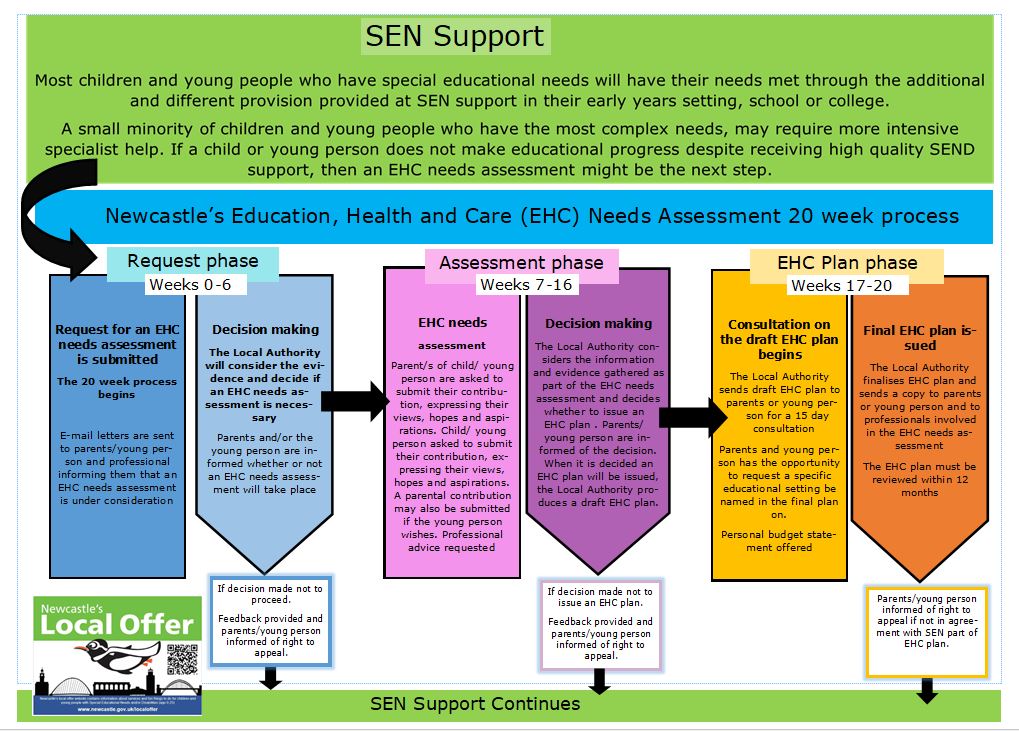Education, health and care (EHC) needs assessment
An EHC needs assessment is a detailed look at the special educational needs (SEN) of a child / young person, and the support they need in order to learn. The assessment is to see if your child or young person needs an EHC plan.
This short video explains what an EHC plan is
If your child is struggling in school and their support doesn’t seem to be working, it’s natural to ask yourself whether they might need an Education Health and Care (EHC) needs assessment.
In reality, only a few children have an EHC needs assessment and plan. For every ten children in England with special education needs or a disability (SEND), two will need an EHC plan and eight won’t.
Most children and young people with SEND go to a mainstream nursery, school or college and are supported by their staff, resources and funds. Teachers and other professionals regularly review how a child or young person is getting on and support them to learn, develop and feel safe. This is called special educational needs support or SEN support.
“In considering whether an EHC needs assessment is necessary, the local authority should consider whether there is evidence that despite the early years provider, school or post 16 institution having taken relevant and purposeful action to identify, assess and meet the special educational needs of the child or young person, the child or young person has not made expected progress.”
- SEND Code of practice
Who can request a needs assessment?
- Parents – by writing to or emailing the local authority. It is always a good idea to talk to the early years setting, school or post 16 provider before asking for an EHC needs assessment.
- A young person over the age of 16 but under the age of 25
- The early years setting, school or post 16 education provider, but only after talking with you first.
- Other people, such as your doctor or a health visitor, can tell the local authority that they think your child needs an assessment.
You can download a template letter to make a request for an EHC needs assessment from IPSEA’s website here.
What happens when the local authority is asked for an assessment
As soon as the local authority receives a request for an EHC needs assessment they must tell you about it.
“In considering whether an EHC needs assessment is necessary, local authorities should pay particular attention to the views, wishes and feelings of the child and his or her parent, or the young person. ”
— SEND Code of Practice
The local authority has up to six weeks to decide whether to conduct a needs assessment. During this time, they may ask you, the school and other professionals for information.
It will look at all the information and then must tell you whether they have decided:
-
to start the EHC needs assessment immediately
-
that an EHC needs assessment is not necessary
If the local authority decides an assessment is not necessary
The local authority must tell you why it thinks that an EHC needs assessment is not needed. It must also tell you about:
-
your right to appeal that decision and the time limit for doing so
-
mediation and disagreement resolution
-
the Special Educational Needs and Disability Tribunal
-
how to get further information, advice, or support
“Local authorities must consult the child and the child’s parent or the young person throughout the process of assessment and production of an EHC plan. They should also involve the child as far as possible in this process. The needs of the individual child and young person should sit at the heart of the assessment and planning process.”
— SEND Code of Practice
If the assessment goes ahead
The local authority will write to you to tell you what will happen and ask for your views. You and your child’s views are really important.
The local authority will ask a number of other people for information about your child.
This advice should include information about:
-
your child’s education, health and care needs
-
the desired outcomes for your child
-
the special educational, health and care provision that might be required to meet their needs and achieve the desired outcomes
The local authority must ask for advice and information from:
-
parents (or the young person)
-
your child’s early years setting, school or post 16 provider — if they have a vision or hearing impairment the local authority must also seek information and advice from a suitably qualified teacher
-
health professionals who work with your child — This might include a paediatrician, speech and language therapist, physiotherapist or occupational therapist
-
an educational psychologist
-
social care staff
-
provisions to assist the child or young person in preparation for adulthood and independent living (from Year 9 onwards)
-
any person requested by the child’s parent or young person, where the local authority considers it reasonable to do so
-
Youth offending teams or Young offender’s institutions (if applicable)
The local authority should also consider any other appropriate information, such as Early Help Assessments, in the case of children of members of the Armed Forces - from the Children's Education Advisory Service, in the case of a looked after child - from the Virtual School Head in the authority that looks after the child and the child’s Designated Teacher and the Designated Doctor or Nurse for looked after children.
You will receive a copy of all the reports when the needs assessment is finished.
The local authority should also try to find out your child’s views. You, the school and other professionals may be able to help with this.
You can find out more about advice and information for EHC needs assessments in the SEND Code of Practice sections 9.45 – 9.52 (external link).
Deciding on the assessment
Once the local authority has all the information and advice it must decide whether your child needs an education, health and care plan or whether your child’s needs can be met through SEN support.
If your child’s needs can be met through SEN support, the local authority must tell you of its decision within 16 weeks of receiving the request for an EHC needs assessment. The local authority must also tell you about your right of appeal.
Timeline
-
When the local authority receives a request for an EHC needs assessment – this is the start date.
-
The local authority decides whether an EHC needs assessment is needed within 6 weeks of the start date.
-
The EHC needs assessment starts as soon as the decision is made.
-
If the local authority decides not to issue a plan, they must tell parents or young person within 16 weeks of the start date.
-
If the local authority decides to issue a plan, they will send a draft EHC plan to parents or the young person.
Newcastle local authority designed the flow chart below to help explain the EHC needs assessment timeline

Newcastle now use a SEND portal for the processing of EHC needs assessments, EHC plans and annual reviews. You can find out more about the SEND portal here.
Would you like to give us feedback on our service?
